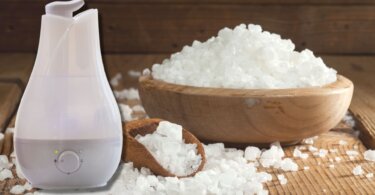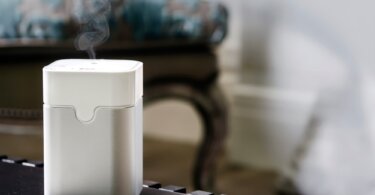Dealing with allergies can be a real test when the weather changes. One minute you struggle with nasal congestion, and the next moment, it turns into a runny nose. If you’re a victim of nasal congestion and phlegm-related problems, you might have thought of getting a humidifier or a dehumidifier to handle this condition. But when you make up your mind to invest in a device that can change your life for the better, the final decision is overwhelming.
Do you need a central humidifier for phlegm, or will a dehumidifier treat your congested nose? Which device is better for the weather you live in? And lastly, which one is worth investing in? If you’re confused between a humidifier and a dehumidifier because of these points, we’ve got you.
Today, we’ll explain these two devices’ benefits for nasal blockage, sinus congestion, phlegm, and mucus blockage to ease your decision.
- Humidifier or Dehumidifier, What Do You Need For Seasonal Colds And Allergies?
- How Does a Humidifier Help Stuffy Nose And Common Cold?
- Is a Humidifier Good For Winters?
- What Are The Disadvantages of Using a Dehumidifier For Nasal Congestion?
- Humidifier or Dehumidifier, What Do You Need For Cough and Flu?
- When Do You Need a Dehumidifier?
- What Are The Primary Types Of a Humidifier?
- Final Words
- FAQs
Humidifier or Dehumidifier, What Do You Need For Seasonal Colds And Allergies?
Before we find out which one of these two devices you need, let’s take a quick look at their working.
Humidifier
When air is too dry, it can cause asthma flares, breathing issues, and nose dryness. These conditions lead to general discomfort and severe allergies if not timely treated.
That’s when a humidifier enters the picture and maintains the optimum moisture balance in your breathing air. If the air you breathe in has less than 35% humidity, it will directly impact your nasal airways and throat.
People from drier regions and lower altitudes often struggle with this problem, but not when they have a humidifier.

Dehumidifier
When your breathing air feels heavy and wet, its moisture contents are above the bearable range. This excess moisture causes multiple health conditions and stimulates the growth of microorganisms in your dwelling. Mold, bacterial, and fungal growth is the common result of excess humidification. A dehumidifier absorbs the extra moisture and creates a balance in your breathing air.
Since a dehumidifier removes excess moisture from the air, it’s commonly perceived as a good solution for colds and indoor allergies. But that’s not always true. A humidifier is better for nasal congestion and a stuffy nose because it dislodges the mucus buildup in your nasal passage.
How Does a Humidifier Help Stuffy Nose And Common Cold?
Weather changes, dust accumulation, and the spread of pollens all result in allergies. Some people struggle with mucus build-up in their noses, while others are stuck with sore throats. Now, if the breathing air around already cold afflicted people is too dry, they’ll have difficulty breathing. Another common effect of dry air is thickening the phlegm and mucus in the nasal passage.
But when you use a humidifier, it works as an effective nasal decongestant. The optimum moisture level in the indoor air is 50%, and you can easily manage that with a humidifier. Inhaling warm and slightly moist air won’t irritate your nose or throat, resulting in lasting comfort and controlled sneezing. People with dust allergies swear by the humidifiers’ benefits because these handy devices overpower their allergy triggers.
Related article: Can Humidifiers Cause Sore Throat?
Is a Humidifier Good For Winters?
Increasing air humidity in cold weather might sound counterproductive, but it’s not. When dry air hits your nasal passage, it triggers allergens and microorganisms, resulting in a stuffy nose, breathing issues, and even sinusitis attacks. Therefore, protecting your nasal airways from these unexpected situations is mandatory.
There are two types of humidifiers for stuffy nose and nasal congestion:
Warm Mist Humidifiers
If your allergies flare up during cold weather when inhaling cold air can worsen the situation, you need a humidifier capable of emitting warm air.
Cold Mist Humidifiers
On the flip side, cold air humidifiers are best for summer months when you need a relaxant for your nasal passage. A good-quality humidifier will retain your breathing air’s moisture content around 50% so that you don’t feel heaviness or unnecessary humidity.
Check out our Best Humidifiers for Hard Water Without White Dust
What Are The Disadvantages of Using a Dehumidifier For Nasal Congestion?
Warm air is associated with comfortable breathing, but it’s often the other way around. Inhaling warm and dry air will result in mucus thickening and nose blocking, eventually causing nosebleeds, constant coughing, and sore throat. Therefore, it’s better to avoid a dehumidifier when you have breathing-related problems.
A dehumidifier will absorb all moisture from your surrounding air, leaving it dry and rough. Now, if you inhale this air with less than 35% humidity, it will trigger allergic reactions in your nasal passage and increase your discomfort.
Humidifier or Dehumidifier, What Do You Need For Cough and Flu?
Overcoming the seasonal cough and flu symptoms gets more challenging because of the compromised air quality. But when you have a reliable device handy, you can halt these flare-ups and take control of your health. Like nasal congestion and stuffy nose, you need a humidifier for cold symptoms and cough as well. The humidifier will ensure you inhale moist air that doesn’t instigate your allergies and breaks the mucus wall in your throat. If you have seasonal cough and cold, use the humidifier for 2-3 days to subside them. But when this situation prolongs, consulting a doctor is better than sticking to this quick remedy.
You should never use a dehumidifier for cough because it will severely attack your throat, leaving you coughing even harder. Headaches, nose itching, and sore throat are some common symptoms of dry air. When you add a dehumidifier in the picture, it absorbs the remaining percentage of moisture as well, eventually worsening your situation. Pick a warm or cold humidifier according to the weather and your indoor air quality to keep these problems at bay.
When Do You Need a Dehumidifier?
You might be thinking by now that you never need a dehumidifier, but it’s not true. A dehumidifier can be useful in improving the indoor air quality so that you’re never exposed to wet living conditions and mold growth. If the area you live in receives above-average rainfall or there’s a sudden weather change, installing a dehumidifier in your home is wise.
The dehumidifier will absorb extra moisture from the indoor air, eventually halting growth of bacteria and mold in your dwelling. Wet living conditions and winter months are worse for people with allergies, sinusitis, and asthma because the air goes hard on their respiratory infections. So, if you have a condition other than seasonal allergies, consult a doctor before altering your breathing air.
What Are The Primary Types Of a Humidifier?
You can select from different types of humidifiers, depending upon your health condition and allergic reactions. Here are the primary types to choose from:
Steam Vaporizers
These humidifiers are ideal for cold months because they emit warm steam to dislodge the mucus in your nasal pathways. However, warm mist humidifiers can be risky to use around children because leaving them unattended can cause electricity sparks.
Ultrasonic Humidifiers
Ultrasonic humidifiers are more advanced and faster because they emit mist at a consistent speed to treat your congested nose.
Impeller Humidifiers
Impeller humidifiers are ideal for kids and elderlies because they don’t pose any safety risks. These humidifiers generate and emit mist by rotating disks at an alterable speed.
Whole-House (Central) Humidifiers
These are fixed humidifiers directly attached to your home’s central air conditioning system. Whole-House (Central) humidifiers are best for places where the breathing air is polluted and loaded with allergens.
Final Words
A humidifier is your best friend if the seasonal cold and allergies always take a toll on your health. Since maintaining the optimal moisture percentage in your breathing air is mandatory, you need a reliable humidifier in your home.
It will keep your indoor humidity level between 30-50 percent humidity so that your allergies don’t get easily triggered.
Whether you have persistent congestion of nasal passages or a stuffy nose, a humidifier can help. But if the heavy and humid air makes things difficult for you, you need a dehumidifier. However, it’s in your best interest to consult a doctor beforehand. If you have sinusitis, asthma, or some other persistent condition, the doctor will suggest a solution accordingly.
FAQs
Do I need a humidifier or dehumidifier for sinuses?
When you inhale extra dry air, the mucus in your nose doesn’t flow properly and results in nasal congestion. If this condition prolongs, you can have breathing difficulties, chest congestion, or nosebleeds. Therefore, you need a humidifier to keep these worries away and break the thick mucus wall in your nasal passage.
Can a humidifier make your sinuses worse?
Warm, humid air will keep your allergy triggers under control and improve the sinus issue. But when your humidifier is not clean and properly maintained, it can worsen your sinus infection. Avoiding tap water, using distilled water, and cleaning the humidifier’s filters are the three primary steps you can follow to avoid any adverse effects.
Related article: What Kind of Water is Best to Use in a Humidifier?
What is better for a stuffy nose, humidifier, or vaporizer?
A vaporizer is better for short-term usage and seasonal allergies and viral infections. It will use hot water to treat your stuffy nose and make breathing easier for you. But if you often struggle with a stuffy nose, a humidifier will keep things under control.
Related articles:
Can You Catch a Cold From Air Conditioning
Why Use a Humidifier in Winter?





Leave a Comment